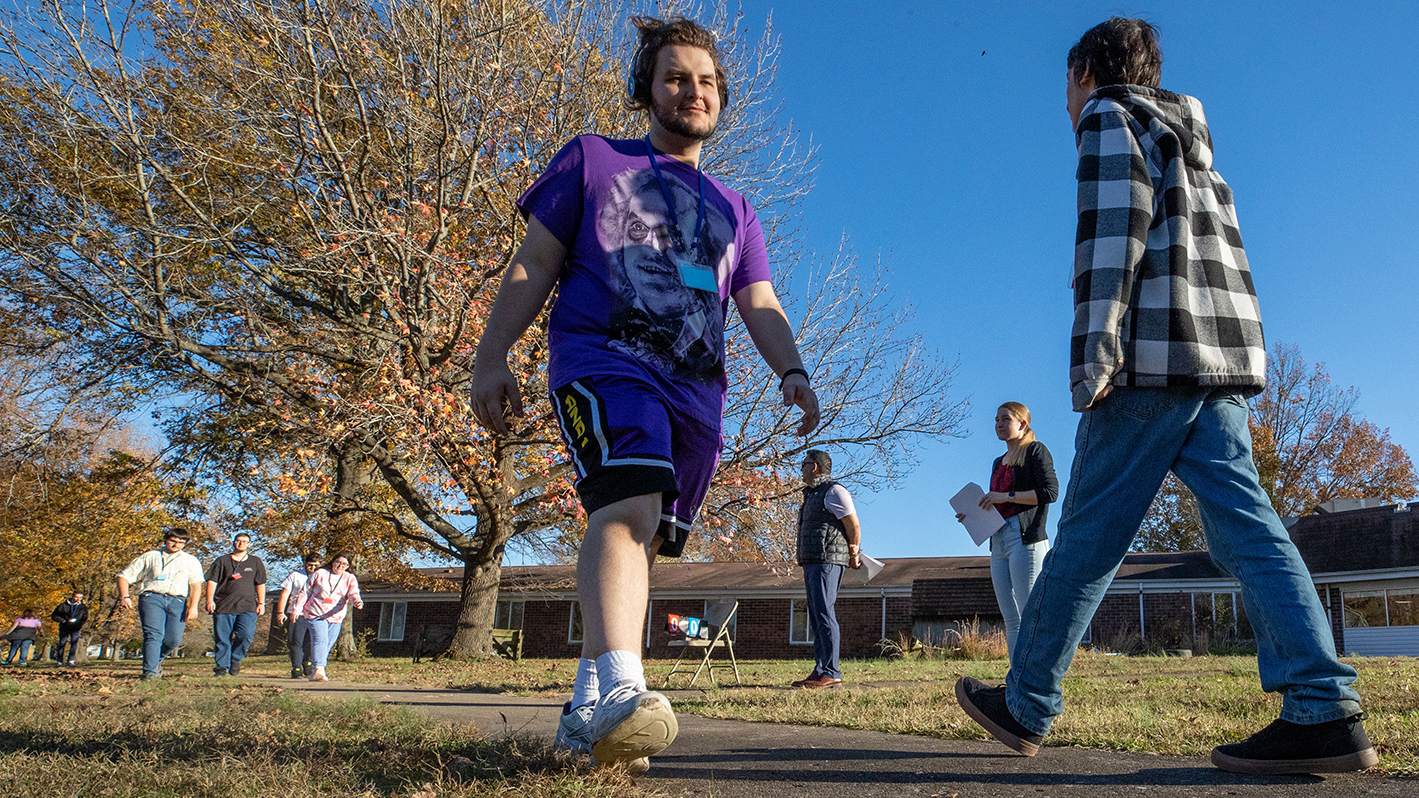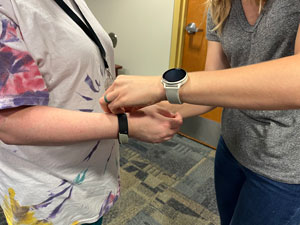
(Above) EDC clients walk and play the Step It Up game in conjunction with a research study conducted by (at rear on the right) David Buckles, Rebecca Seward and Professor Ryan Redner (not shown.) (Photo by Russell Bailey) (Below) Rebecca Seward helps a participant put on a Fitbit before a game session. (Photo provided)
June 12, 2025
SIU researchers discover incentivized game spurs activity in adults with disabilities
CARBONDALE, Ill. — The lack of exercise is more pronounced among adults with disabilities than the general population, but a team of researchers from Southern Illinois University Carbondale is discovering that a simple game with low-cost prizes may offer solutions.
“The overreaching goal of our research is to see if we can utilize incentives in a variety of ways in conjunction with the Step It Up exercise game to make activity more attractive to people, especially those with disabilities, and get them to willingly participate,” said Ryan Redner, professor and director of the behavior analysis and therapy program in the School of Psychological and Behavioral Sciences. He said the game had previously been used successfully with elementary school students, but there was little or no documentation of its use with adults, particularly adults with disabilities. Their studies are showing it is effective.
Costly problem in many ways
“The CDC tracks physical activity, and only about one-fourth of all adults get the amount they need,” Redner said. “For people with disabilities, it’s even worse. There are numerous proven negative health impacts when people don’t get adequate physical activity, and the issue becomes systemic.”
According to the Centers for Disease Control and Prevention, the lack of physical activity among Americans increases their risk for a variety of health issues, including diabetes, heart disease and high blood pressure, and that adds up to $117 billion or more in health care costs each year.
Rebecca Seward, a St. Louis native and recent psychology doctoral program graduate with a concentration in behavioral analysis and therapy, proposed the research to Redner after working with adults with disabilities in supported residential settings at the Choate Mental Health and Developmental Center in Anna, Illinois, and then at SIU’s Evaluation and Developmental Center (EDC) and reading about the use of the game with third-graders.
Redner quickly agreed to mentor and assist, and they have been involved in a series of interrelated research studies since 2022. All have taken place at EDC, which provides vocational, psychological and transitional services to adults with disabilities. Seward said the facility is the perfect setting for their research focusing on different elements and interventions in conjunction with Step It Up to increase physical activity among EDC clients.
The researchers have completed seven studies so far and just launched an eighth this summer. Thus far, their research has found that in every form and fashion, to one degree or another, the intervention is effective in increasing exercise among participants. Seward and Redner have already published several papers detailing their research with more pending. David Buckles, a Fenton, Michigan, native who currently resides in Carterville, Illinois, and graduated in May with a master’s degree in behavior analysis and therapy, assisted with one of the studies.
“Part of our mission is to provide research opportunities for faculty and students at SIU,” said LaDonna Henson, EDC director. “We are proud of the research Rebecca, David and Professor Redner have done and the incredible response from the research community. Our program participants have benefitted greatly from the research outcomes as well. There is so much study and research that needs to be done around the population we serve, and we are in a unique position to offer a wealth of research opportunities.”
Numerous research projects completed, another underway
With a bachelor’s degree in psychology from Indiana University-Purdue University Indianapolis, Seward chose SIU for her advanced studies “because of the opportunities it provides.” She completed her master’s degree in behavior analysis and therapy and passed her exam to become a board-certified behavior analyst in 2020. She continued her academic career at SIU with her doctorate, and as a Saluki from 2018 to 2024, she served a variety of graduate assistantships, which she said provided her professional development and paid for her school while offering “fantastic opportunities to apply skills I learned in the classroom into everyday professional practice.”
Seward has spent countless hours at the EDC, continuing to visit, work and research there almost daily as a volunteer, even after completing her doctoral degree in December. She said the results of her studies have been fascinating and amazing.
 Redner explained said that for the first study, the participants were divided into two teams. Members of each team were given Fitbits to record their steps, but the count was covered so they couldn’t see it. At the end of 15-minute periods, the number of steps per minute for all members of each team was calculated, and members of the team with the highest total got to participate in a drawing for a small toy, candy or $10 gift card. If both teams were within 10% of the average step number, members of both teams could draw.
Redner explained said that for the first study, the participants were divided into two teams. Members of each team were given Fitbits to record their steps, but the count was covered so they couldn’t see it. At the end of 15-minute periods, the number of steps per minute for all members of each team was calculated, and members of the team with the highest total got to participate in a drawing for a small toy, candy or $10 gift card. If both teams were within 10% of the average step number, members of both teams could draw.
“We want an intervention that’s effective, that could be incorporated into day programs, used easily anywhere, everywhere,” Redner said. “We knew that for it to work with adults, it would need to be fun and include an incentive in order to attract them to participate. The long-term goal is to build it into a system so it can be implemented simply and effectively by one or two people in an educational, day care or other setting.”
There was an amazing opt-in rate, exceeding 90% for the majority of the sessions.
“More importantly, we found the game was in fact effective at increasing the physical activity levels of adults with disabilities,” Seward said.
The average number of steps for participants doubled, from about 24 to 54 per minute. The first study served as good proof of their concept, but the researchers knew there were many more avenues to investigate.
“There are so many possible interventions, so many other factors we could introduce and explore,” Seward said. She also noted that the beauty of the game is that it’s easy to implement and relatively inexpensive.
The next couple of studies sought to determine whether adding positive interaction from the researchers would improve participation and whether the game would remain effective through more sessions that lasted longer. The sessions were increased from 15 to 30 minutes – which more closely correlates to the CDC recommendation that adults engage in 30 minutes of moderate physical activity five times per week, Seward notes, and the program was extended from 11 to 40 sessions.
“We found that the game step counts increased and remained high after lengthening the session duration and number of sessions,” Seward said. Participation again was strong, with more than 96% choosing to play, and the average step count increased by 35 steps per minute. The researchers said that although colleagues reported providing interaction and encouragement was effective with children, they found no substantial increase in step counts with adults.
The game uses multiple components. For one study, the researchers dissected the various elements, including teams, praise, prizes and so forth to determine if some parts were more or less important.
“Our findings indicated that all the components of the game were necessary to produce the greatest increase in step counts among our participants,” Seward said.
Another study involved staff training. The researchers used a behavior skills training procedure to teach the EDC staff how to facilitate the game with clients so they could implement it without assistance from researchers. Seward said the better staff were trained and adhered to the intervention, the more active clients were.
“I can see the information presented in this study being useful for teachers, coaches and direct care staff looking for a way to encourage their clients or students to be more active,” Seward said.
Don’t stop
For the study Buckles assisted with, the team decided to change things up. They instead used a demerit-based intervention that they dubbed the Don’t Stop game for their research. Buckles got involved with the research in January 2024 in conjunction with his master’s thesis. The study asked participants to walk continuously for 30-minute sessions. If a participant stopped walking for more than a few seconds, the team received a demerit, and the participant was informed. The team that got the fewest demerits was able to participate in a prize drawing; if both teams got under the 10-demerit threshold, they both won.
“This study found that a demerit-based physical activity intervention was just as effective as Step It Up in increasing step counts,” Buckles said.
A nontraditional student, Buckles holds a bachelor’s degree in business administration from Belmont University and worked for many years in the business world as a contract negotiator for a pair of workers’ compensation insurance companies and manager of the emergency room administrative staff at a hospital in downtown Chicago. As he looked to make a career change, he was drawn to SIU because its behavior analysis and therapy program is held in high national regard and he likes the location, he said. He couldn’t be happier about the decision as the faculty and research opportunities at SIU have provided him with “an amazing education,” and he’s honored that his research was published while he was still in school. He began working as a behavior analyst at Tri-County Special Education while completing his degree.
Published multiple times as a student
Seward graduated with numerous publications to her name.
“I think publishing your work while still in school is important because it allows you to contribute to the field and get honest and constructive feedback on your work from other experts outside of your immediate network,” Seward said. “I was ecstatic when I received that first ‘accept’ email from the journal I had submitted the first game study to. I still remember exactly where I was when I got the acceptance email – relaxing at a Sunset Concert with family and friends. I don’t think I’ll ever forget that exciting moment.”
Seward is pursuing a career in academia, teaching and conducting research and has already obtained a faculty position.
“My ideal career path is one that allows me to continue supporting individuals with disabilities, helping them reach their health and wellness goals,” Seward said. “My work at SIU in the classrooms, my graduate assistantship and research have given me the knowledge and practical experience to pursue and achieve my career goals.”
More to learn
The SIU researchers say they’ve learned much through their research at the EDC, but they are far from finished.
“More work remains to be done,” Redner said. “While the client step counts have improved markedly, they still aren’t meeting the recommended CDC guidelines of about 100 steps per minute for 30 minutes to reach the desired health benefits. Ultimately, the goal would be for participants to be taking the number of steps they need as part of their daily decision process.”
In their latest research project, Seward and Redner will evaluate different durations of the game and its effect on step count rates among participants. He said plans call for numerous future studies focusing on other variables, including the immediacy of the reinforcement and enhancing incentives.
